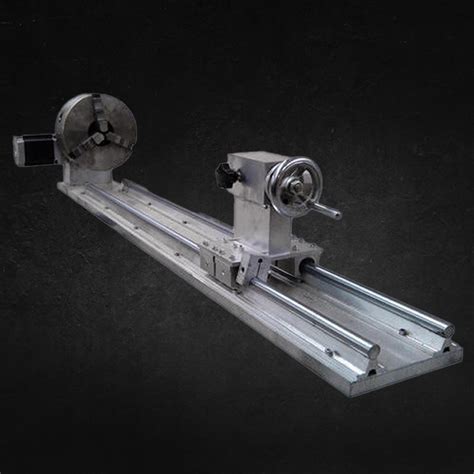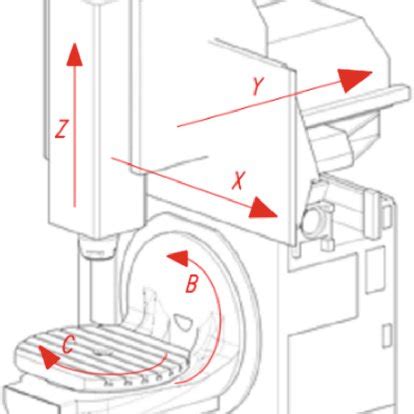axis continuous cnc machining Also known as 3+2 machining, 5-axis indexed machining does not maintain continuous contact of the cutting tool and work piece through all . Metal stamping is the manufacturing process in which a strip of sheet metal is fed through one or more die and tool sets to apply pressure, re-forming and cutting the piece into a desired shape.
0 · cnc with rotary axis
1 · cnc machine axis locations diagram
2 · cnc machine axis direction
3 · cnc axis explained
4 · cnc axis chart
5 · axis identification in cnc machine
6 · 4 axis cnc milling machines
7 · 4 axis cnc machine cost
Numco USA is your number one sourcing agent for custom metal stampings. We work with only the best, most capable domestic and offshore contractors to ensure that your parts and components match your designs exactly and .
Full continuous 5-axis machining can rotate two rotary axes simultaneously while machining and the tool moves linearly in XYZ coordinates. 5-axis machining offers designers enormous flexibility to design very complex .
Also known as 3+2 machining, 5-axis indexed machining does not maintain continuous contact of the cutting tool and work piece through all . Full continuous 5-axis machining can rotate two rotary axes simultaneously while machining and the tool moves linearly in XYZ coordinates. 5-axis machining offers designers enormous flexibility to design very complex 3D geometries and can also produce parts with complex curved 3D surfaces. Many people tend to confuse these two techniques. 5-axis CNC machining, also known as continuous 5-axis machining, involves the continuous rotation of cutting tools along five axes. In contrast, 3+2-axis machining executes a 3-axis program. Also known as 3+2 machining, 5-axis indexed machining does not maintain continuous contact of the cutting tool and work piece through all rotational axes. It does, however, share many of the same benefits as standard 5-axis machining, such as: dimensional stability due to fewer set-ups; improved surface finish using shorter tooling
In this complete guide to 4 Axis CNC Machining, you’ll learn when to use one, how they work, 4 Axis CNC workholding, Programming, and 4 Axis for CNC Routers.
cnc with rotary axis
cnc machine axis locations diagram
Discover the benefits of 5-axis CNC machining in precision manufacturing. From enhanced accuracy to faster production and optimized tooling, learn how 5-axis technology is transforming aerospace, medical, and automotive industries with complex geometries and high-quality finishes. Explore why investing in 5-axis machines could elevate your manufacturing . Here's how 5-axis CNC machines are transforming manufacturing: 1. What is 5-Axis CNC Machining? Unlike traditional 3-axis systems, 5-axis machines move a part or tool along three linear axes (X, Y, Z) while rotating it along two additional axes (A, B). This capability allows manufacturers to approach the workpiece from virtually any angle . Most CNC machines are either 3- or 5-axis, and, in this article, we’ll look at their differences and what they’re each good for. A 3-axis CNC machine, such as a lathe, mill, or machine tool center, moves its tool (whether it’s a cutter, drill, or mill) along the X (left to right), Y (front to back), and Z (up and down) axes. In continuous 5-axis CNC machining, the cutting tool and the workpiece can rotate and move simultaneously during operation, saving time and allowing operators to manufacture intricate geometries with organic surfaces.
5-axis machining is a complex but feasible technology. Some machines are specifically designed for this task and employ continuous numerical control methods. This involves constantly adjusting the cutting tool on all 5 axes to maintain optimal perpendicularity between the drill and the cutting surface. Five-axis indexed machining is perfect for parts that don’t require extreme contour controls like jigs, fixtures, housings, and other components frequently used in manufacturing. If you need to manufacture a design with extremely fine . Full continuous 5-axis machining can rotate two rotary axes simultaneously while machining and the tool moves linearly in XYZ coordinates. 5-axis machining offers designers enormous flexibility to design very complex 3D geometries and can also produce parts with complex curved 3D surfaces.

Many people tend to confuse these two techniques. 5-axis CNC machining, also known as continuous 5-axis machining, involves the continuous rotation of cutting tools along five axes. In contrast, 3+2-axis machining executes a 3-axis program. Also known as 3+2 machining, 5-axis indexed machining does not maintain continuous contact of the cutting tool and work piece through all rotational axes. It does, however, share many of the same benefits as standard 5-axis machining, such as: dimensional stability due to fewer set-ups; improved surface finish using shorter tooling
cnc machine axis direction
In this complete guide to 4 Axis CNC Machining, you’ll learn when to use one, how they work, 4 Axis CNC workholding, Programming, and 4 Axis for CNC Routers. Discover the benefits of 5-axis CNC machining in precision manufacturing. From enhanced accuracy to faster production and optimized tooling, learn how 5-axis technology is transforming aerospace, medical, and automotive industries with complex geometries and high-quality finishes. Explore why investing in 5-axis machines could elevate your manufacturing .
Here's how 5-axis CNC machines are transforming manufacturing: 1. What is 5-Axis CNC Machining? Unlike traditional 3-axis systems, 5-axis machines move a part or tool along three linear axes (X, Y, Z) while rotating it along two additional axes (A, B). This capability allows manufacturers to approach the workpiece from virtually any angle . Most CNC machines are either 3- or 5-axis, and, in this article, we’ll look at their differences and what they’re each good for. A 3-axis CNC machine, such as a lathe, mill, or machine tool center, moves its tool (whether it’s a cutter, drill, or mill) along the X (left to right), Y (front to back), and Z (up and down) axes. In continuous 5-axis CNC machining, the cutting tool and the workpiece can rotate and move simultaneously during operation, saving time and allowing operators to manufacture intricate geometries with organic surfaces. 5-axis machining is a complex but feasible technology. Some machines are specifically designed for this task and employ continuous numerical control methods. This involves constantly adjusting the cutting tool on all 5 axes to maintain optimal perpendicularity between the drill and the cutting surface.
french ornate metal window boxes

cnc axis explained
No one makes it easier to save while getting a fully customizable steel storage container quote in minutes! Shop Solutions. Compare Supplier Prices. Decide. Get the best pricing for steel .
axis continuous cnc machining|cnc with rotary axis